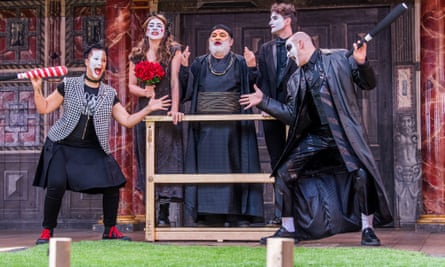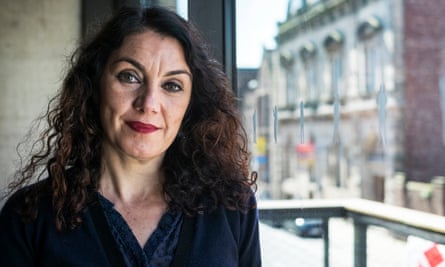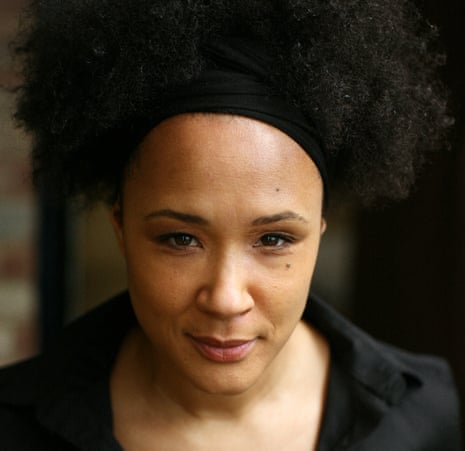When Golda Rosheuvel stars as Othello at the Liverpool Everyman this month it will not be the first time that a woman has taken on the role. In the early 19th century, Mrs Percy Knowles, who also performed Hamlet, was one of several female actors to do so. In 2015, Smooth Faced Gentlemen staged the play with an all-female cast. But in those versions, the women were playing male roles. Rosheuvel’s Othello, in Gemma Bodinetz’s production, will almost certainly create waves because her general is an out lesbian.
Before she went to see Bodinetz about joining the Everyman’s ensemble to play the role, Rosheuvel knew that – if she got the job – her Othello would not be gender neutral but female. Rosheuvel, who was the best Paulina I’ve ever seen in Simon Godwin’s 2009 production of The Winter’s Tale, already has form in this department. Last year she played a female Mercutio in the Globe’s Romeo and Juliet, winning praise for her performance and the subtle undertones it brought to the character’s relationships with Romeo and Benvolio in Daniel Kramer’s much-derided staging.
Bodinetz, who began running Liverpool’s Everyman and Playhouse theatres 15 years ago, when very few women were heading up major British theatres, was also certain that she wanted to put a female Othello centre stage. Playing Othello is “important to me as a black, gay, female actor,” says Rosheuvel who moved to the UK from Guyana when she was five. She adds wryly: “just look at how many boxes I can be put in.” She and Bodinetz reckon that part of Iago’s gripe is that he thinks a black lesbian in charge of the army is “box-ticking at its most ridiculous”. Rosheuval points out that Othello is a play in which women and their sexuality are a source of fear for many of the male characters, and this ups the stakes considerably.

“Some men have a terrible fear of women, particularly powerful women,” says Rosheuvel. “They would prefer not to see change, and this Othello is part of change. She is a woman who has power over all these men, all that testosterone. How does she negotiate that? Then she goes further and brings her lover – Desdemona – into that arena. It’s a scary thing to do.”
“I wanted to make a modern audience sit up and feel something of what a Jacobean audience must have felt at seeing a black man commanding an army,” explains Bodinetz. “I wanted to make the play feel electric again.” But by making Othello female and gay she is not setting out to shock for the sake of it. “We’re not doing this despite the text, but with the text,” she says. “We are just trying to rub it in our own times, and make it shine for the beautiful dare of it, and in the process come up against some of our own prejudices and our assumptions about what leadership is and who can hold power.”
Questions of race, class and gender are currently being much debated in the industry. Why aren’t there more women and people of colour running our theatres? Why might it be that the widely admired Rosheuvel is, at the age of 47, only now taking a lead role?

“Look, I’ve had some great roles and worked with fantastic directors in great venues, but this is the first time I’ve played the lead. Why is that? I don’t know. I could jump on a bandwagon and say it’s because I’m black, I’m a woman and gay. But maybe it’s also because my career has always been very eclectic. And I love that. I’m always looking for things that interest me, that are different. You don’t employ me if you want beige, I’m all about bright colours.”
Nonetheless she believes that “there’s a problem in British theatre and we wouldn’t have Act for Change and Time’s Up if there wasn’t. What I can’t ever know for sure is how much it has affected my own career. But I do wonder why it took until last year for me – someone who was raised on Agatha Christie dramas – to be cast in a period drama.” It was, she says, a dream come true to be cast in Lady Macbeth, written by Alice Birch.
“There are plenty of black actors, writers and directors out there. There are plenty of women. We just need to be given the opportunities, and the money. That’s how real change happens, that’s how you crack it open.”
A woman playing a female Othello is part of that. Bodinetz, as a female artistic director in what has been a male domain, is particularly interested in the dynamics of power and the stresses faced by women as they climb the ladder of success.
“What can be harder than being a black, gay woman commander in the army? This is a woman who has fought to get where she is, and made sacrifices to do it. It means she has a lot to lose and so what happens and how does she behave when everything is taken from her? All women who rise to power have to navigate the land mines … We have to deal with the male game-playing and negotiate the structures that men have set in place. It can be exhausting and stressful, and often it means giving up things.”
What have Bodinetz and Rosheuvel given up to get to where they are? “Time with my family,” says Bodinetz quietly. “My ego,” says Rosheuvel. “You have to keep it in check or as an actor you are constantly saying ‘why not me?’. I’ve learned to say: ‘Just relax, your time will come.’” Now, at last, it has.
- Othello is at Liverpool Everyman from 28 April. Box office: 0151 709 4776.
